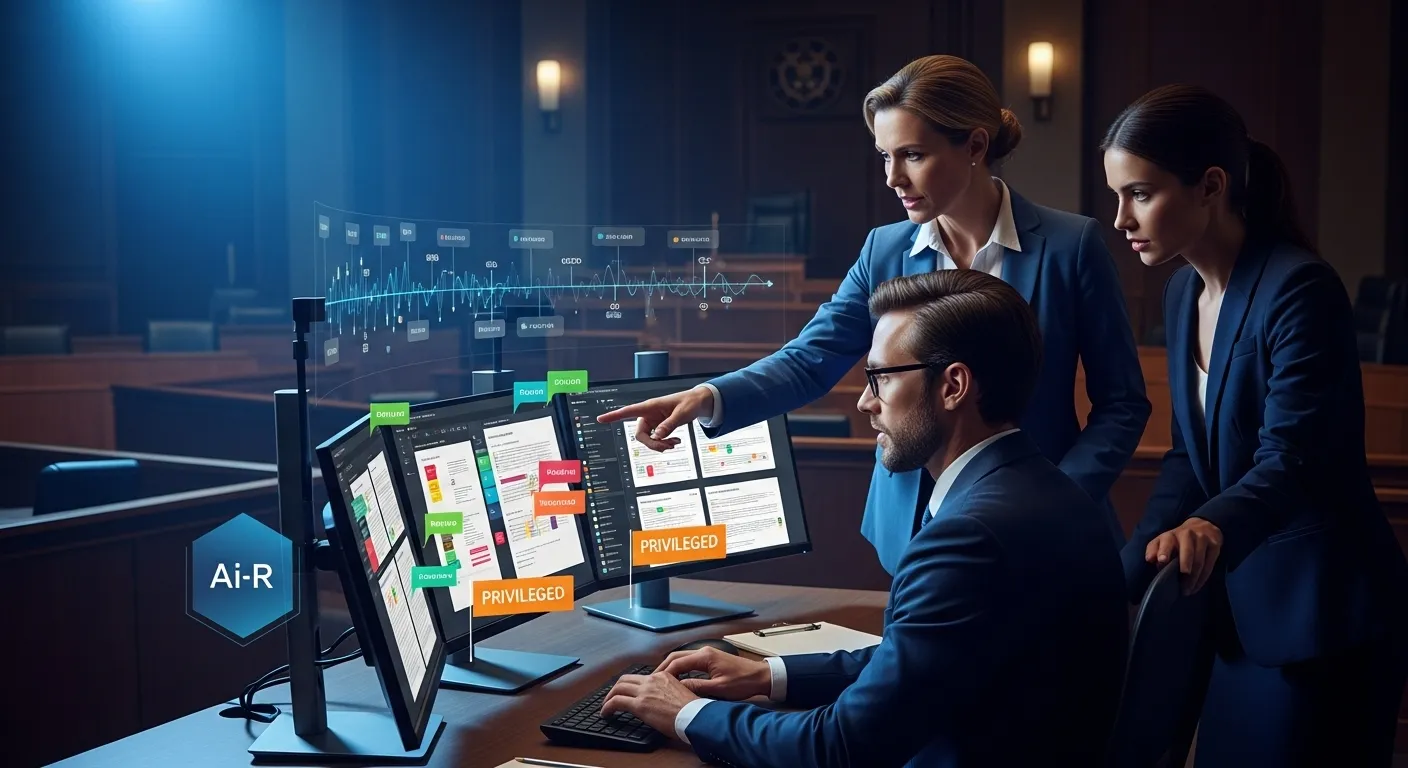What Is Relativity’s Generative AI (aiR)?
Relativity’s aiR is a family of generative AI tools embedded into RelativityOne, designed for eDiscovery and investigations. Flagships include aiR for Review (rapid first-pass review) and aiR for Privilege (find and explain privilege calls). Newer additions like aiR for Case Strategy help turn documents and transcripts into timelines and key facts—so litigators jump to insights sooner rather than later.
How It Works
Inside RelativityOne, teams kick off matters as usual—collection, processing, hosting. aiR then layers gen-AI capabilities: summarize and classify documents, propose coding decisions, surface potentially privileged content with reasoning, and assemble storylines from people, dates, and issues. Relativity reports heavy, real-world throughput (millions of docs/day across customers) and is moving to make gen-AI capabilities standard within its cloud packages to normalize access across matters.
Benefits & Use Cases
- Speed-to-insight: Collapse first-pass review from weeks to days; tee up QC rather than grind through every page.
- Privilege confidence: Catch borderline privileged material and understand why via model explanations—useful for defensibility.
- Case building: Turn messy data into fact chronologies and witness prep notes; great for early case assessment and strategy memos.
- Scale bursts: Handle surges (e.g., regulatory deadlines) without spinning up 100 reviewers overnight.
- Public sector & global teams: New availability and packages broaden who can deploy aiR in sensitive, large-scale matters.
Costs/Pricing
Relativity typically bundles capabilities within RelativityOne contracts rather than public per-seat sticker prices. Industry watchers note that vendors (including Relativity) rarely publish gen-AI pricing and costs can be significant, depending on volume, matter count, and region. Recent announcements indicate aiR review tools becoming standard in cloud packaging, which may shift cost dynamics for many teams. Always validate contract terms, usage limits, and expected doc volumes before rollout.
Local Insights (GEO)
Bangladesh & South Asia: Cross-border investigations and disputes are common—expect data to live across email servers, messaging apps, and cloud suites. Consider:
- Data transfer & hosting: Plan for data residency and transfer risk when hosting matters in non-local cloud regions.
- Language & script: aiR’s generative summaries can help with mixed English/Bengali corpora; still include bilingual QC.
- Budgets & timelines: Use aiR for early case intelligence to prioritize custodians and collections before costly full reviews.
- Client comms: Explain AI’s role, validation steps, and privilege safeguards to in-house teams and regulators.
Alternatives & Comparisons
- DISCO (Cecilia / Auto Review): Strong gen-AI auto-tagging and doc summaries; marketed high throughput and expanding EU/UK access. Pros: speed claims and explainability; Cons: different ecosystem than Relativity—migration/interop to consider.
- Reveal (Brainspace + aji): Robust analytics lineage plus new GenAI review (aji), with promotional free access through 2025. Pros: advanced visuals & workflows; Cons: switching costs if your shop is standardized on Relativity.
- Everlaw (AI Assistant & Deep Dive): Integrated drafting, coding suggestions, and strategy queries; strong thought leadership and public-sector push. Pros: smooth UX; Cons: platform shift required.
Step-by-Step Guide
- Identify target matters: Start with a contained, time-boxed review or regulatory response where speed matters.
- Configure aiR workflows: Define issue codes, privilege rules, and prompts; set sampling and validation thresholds.
- Pilot & measure: Track precision/recall, overturn rates, time per doc, and reviewer hours saved.
- Harden defensibility: Save model rationales, validation stats, and QC notes; align with outside counsel guidelines.
- Scale & train: Roll best-practice prompts and QC templates to new matters; document exceptions for sensitive data.
FAQs
Is Relativity’s generative AI worth it?
If you already live in RelativityOne, aiR can materially accelerate first-pass review and privilege identification—and now it’s becoming standard in cloud packaging, which improves ROI for many teams. Validate on your own data with a measured pilot.
How long does setup take?
Pilots can start quickly if your data is already hosted. Expect a short period to define prompts, sampling, and validation—then speed gains compound as reviewers shift to QC.
Are there risks?
Yes—misclassification, over-reliance on summaries, and data transfer concerns. Mitigate with statistical validation, bilingual QC where needed, privilege counsel oversight, and clear audit trails of AI decisions.
Bottom Line
Relativity’s integration of generative AI turns eDiscovery from “mountain of docs” into “measurable pipeline.” With aiR now central to RelativityOne—and expanding globally—legal teams can review faster, protect privilege more confidently, and build strategy earlier. Pilot smart, validate hard, then scale.
Sources
- PR Newswire — Relativity to make aiR for Review & Privilege standard in RelativityOne; throughput, adoption & case study
- Relativity Blog — A Year of aiR: 2024 highlights and roadmap
- Relativity — aiR for Privilege product page
- Relativity Blog — Legal Data Intelligence & gen-AI direction (2025)
- Relativity/IDC — Generative AI in Legal 2024 (industry study)
- Relativity News — Launch context for aiR for Review
- Legaltech Talk — aiR availability expands across Asia
- UNC Law Library — On undisclosed pricing and cost considerations for legal gen-AI
- DISCO — Generative AI Auto Review overview
- Reveal — aji GenAI review engine (free access through 2025)
- Everlaw — AI Assistant capabilities
- Everlaw/ILTA/ACEDS — 2025 Ediscovery Innovation Report (industry trends)

